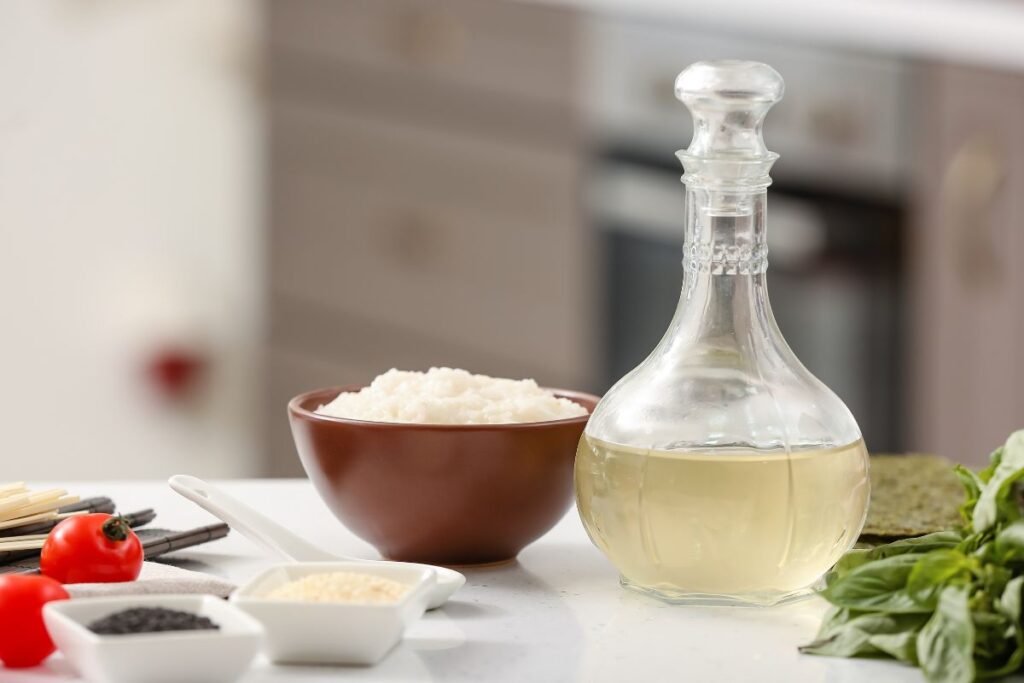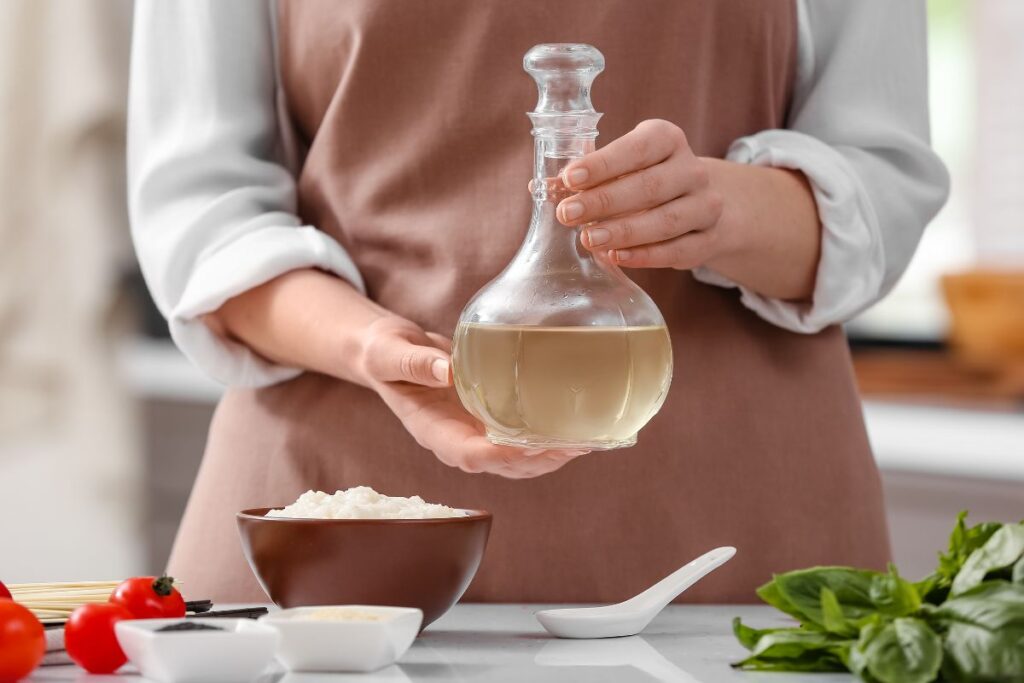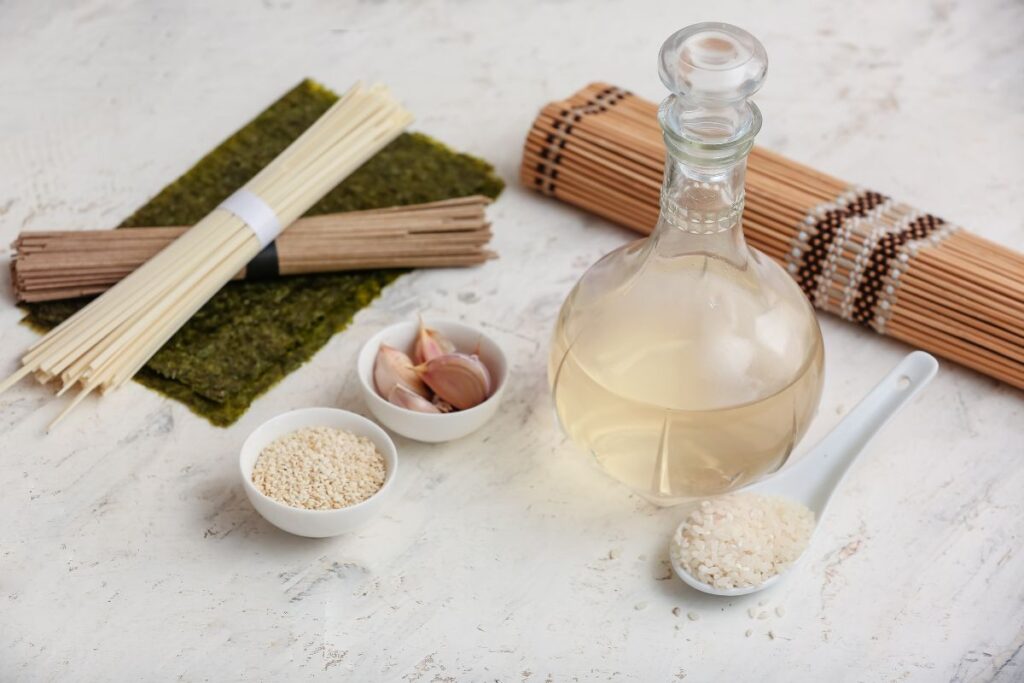Uncover the secret ingredient that elevates Japanese cuisine to new heights. It’s not the bold flavors or exotic ingredients that steal the show, but rather the humble rice vinegar that quietly works its magic.
From sushi rice to savory dishes, this unsung hero adds a subtle tang that transforms ordinary meals into unforgettable culinary experiences.
Join us as we delve into the role of rice vinegar in Japanese cooking, exploring its historical significance, versatile nature, and even its potential health benefits.
Get ready to embark on a flavorful journey that will forever change the way you view this staple ingredient in Japanese gastronomy.


Historical Significance of Rice Vinegar
Rice vinegar has been a cornerstone in Japanese cuisine for centuries, shaping the nation’s culinary heritage. You’ve likely encountered its subtle tang in sushi rice, dressings, and marinades, but its influence extends far beyond mere flavor enhancement.
Historically, rice vinegar wasn’t just a culinary ingredient; it was a cultural emblem, symbolizing purity and preservation. You can harness this tradition to elevate your cooking, embracing rice vinegar’s capacity to balance and enhance flavors.
Understanding its historical significance empowers you to make informed choices in the kitchen. In ancient times, rice vinegar was valued for its health benefits, believed to aid digestion and promote vitality. It’s this historical context that underscores its enduring appeal.
Sushi Rice Preparation
Building on its historical roots, let’s explore how rice vinegar is key to perfecting your sushi rice, a fundamental step in crafting authentic Japanese cuisine.
You’re aiming for rice that’s sticky yet retains individual grain integrity—achievable with the right blend of vinegar, sugar, and salt.
First, you’ll need to cook your rice precisely. Aim for a slightly firmer texture than regular table rice; it’s crucial for sushi’s structural integrity.
Once cooked, transfer the rice to a wooden bowl—preferably a hangiri—if you’re sticking to tradition, which helps absorb excess moisture. Now, the pivotal moment: seasoning your rice.
For every cup of rice, you’ll gently fold in a mixture of rice vinegar, sugar, and salt that you’ve warmed just enough to dissolve the solids.
This isn’t just about taste; it’s a transformative step that gives sushi rice its characteristic tang and glossy appearance.
You’re in control here—adjust the sweetness and tanginess to your preference, but remember, balance is key. Don’t rush the cooling process; fan the rice if you must, to give it that perfect, shiny finish.
Mastering this technique places you at the heart of Japanese culinary tradition, turning simple ingredients into an art form.
Enhancing Flavor Profiles
Delving into the realm of flavor enhancement, you’ll find that rice vinegar not only perfects the texture but also elevates the taste profile of your dishes. It’s not just about adding a tangy kick; it’s about creating a harmonious balance that captivates your palate.
You’ll discover that the subtle acidity of rice vinegar can brighten flavors without overwhelming them, making it an indispensable tool in your culinary arsenal.
When you’re aiming to achieve that elusive umami, rice vinegar’s versatility comes to the fore. Whether you’re dressing a salad, marinating meat, or finishing a sauce, a splash of rice vinegar can transform the ordinary into the extraordinary.
It’s your secret weapon for adding depth and complexity to your cooking, ensuring that every bite is a sensory delight.


Versatility in Dishes
You’ll find that rice vinegar’s adaptability shines across a wide array of dishes, from refreshing salads to hearty stews. Its subtle tanginess can elevate the flavors in your cooking, giving you the reins to control the balance between sweet, sour, and savory.
When you’re whipping up a quick pickle, a dash of rice vinegar can transform ordinary vegetables into a zesty side dish. It’s your secret weapon for adding a crisp, clean taste that doesn’t overpower.
In marinades, rice vinegar works wonders by tenderizing meat while infusing it with flavor. You’ll notice how it melds seamlessly, ensuring your grilled or roasted dishes are both succulent and aromatic.
It’s about finding the right harmony, and rice vinegar allows you to tweak the acidity to perfection.
Even in dressings and sauces, the versatility of rice vinegar stands out. You can craft a light, invigorating dressing for your salads or a tangy sauce for dumplings, all while steering clear of the overpowering sharpness found in other vinegars.
This control lets you fine-tune your dishes to match your palate, showcasing rice vinegar’s role as a pivotal, yet unassuming, star in Japanese cooking.
Health Benefits of Rice Vinegar
While exploring the culinary versatility of rice vinegar enhances the taste of various dishes, it’s also worth noting its impressive health benefits.
You might be seeking ways to control your health and well-being, and incorporating rice vinegar into your diet is a smart move. Rich in amino acids, it can help combat fatigue, offering you the energy boost you need.
Its acetic acid content aids in weight control, prompting your body to burn fat more efficiently. You’ll find managing your weight becomes a more attainable goal with rice vinegar as your ally.
Moreover, rice vinegar possesses antimicrobial properties, which can safeguard your health by inhibiting harmful bacteria’s growth. This makes it not just a culinary ingredient but a protective measure in your diet.
It also promotes cardiovascular health, thanks to its ability to help lower cholesterol levels. You’re not just enjoying delicious meals; you’re taking proactive steps towards a healthier heart.
Conclusion
In conclusion, we’ve explored the significance of rice vinegar in Japanese cooking. However, it’s important to note that there are some who argue that rice vinegar may not be as essential as it seems.
They believe that other types of vinegar can be used as substitutes without compromising the taste of dishes.
What are your thoughts on this? Do you believe that rice vinegar is indispensable in Japanese cuisine, or do you think other vinegars can be equally effective? Leave a comment below and let’s know your perspective!




Konnichiwa! (Hello!) I'm Pat Tokuyama, a Japanese tofu cookbook author, who travels for music, food, and adventure. If you like Japanese tea, checkout some of the newestorganic japanese tea, matcha bowls and noren and more!
** Curious about the Plant Based Japanese Cooking Club? ** Learn more here!